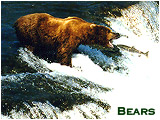
|

















Bears are large carnivorous mammals that also graze on vegetation. The grizzly bear eats grasses, herbs, berries and nuts, as well as living or dead animals. The Kodiak, a species of brown bear, found on Kodiak Island in Alaska, can reach a weight of 1700 pounds and a height of 10 feet. Bears posses a very keen sense of smell permitting detection of new odors over large distances.
Bears are smart and have been shown to learn new feeding patterns based on campers' food and garbage. Bears may become used to humans but they are far from tame. Having fed on human food, they many approach visitors in search of more. Ripping through a tent or sleeping bag is nothing more than checking out any smell that may be food.
If a bear raids a camp it may get shot by frightened campers. If a bear hurts anyone, the government will track it down and destroy it. Increased human intrusion into wilderness areas have lead to maulings of humans, retaliation by the victim or the authorities and thus a decline in bear populations.
The most important safety factor when camping in bear country is keeping and maintaining a very clean camp. We set up in triangle formation with point A as storage for food and supplies in bear proof canisters. Anything that has a scent such as toothpaste, soap, sunscreen, or cough drops remain at Point A. We carefully select as many scentless items as possible but even "unscented" products have some kind of fragrance and remain at Point A.
Point B, one hundred yards away, is where we cook and is below the tide line. The incoming tide washes away any scents or odors we deposited during food preparation and eating.
One hundred yards inland is point C, the third leg of the triangle and this is where we sleep. As a good general camping rule, we never bring food or any edible items like candy, gum, or energy bars anywhere near where we sleep. Using a triangle formation, is somewhat inconvenient, but keeping a clean camp could save our lives and the lives of the animals who live here.
Camping in Bear Country